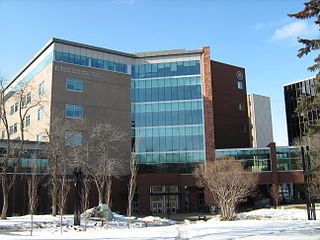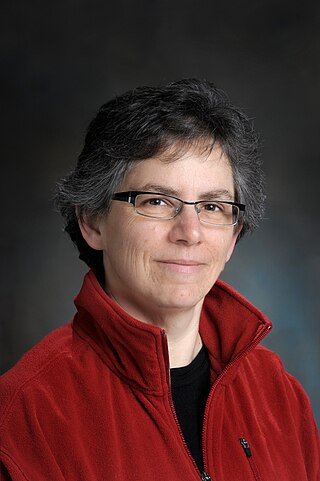
Simon Fraser University (SFU) is a public research university in British Columbia, Canada, with three campuses, all in Greater Vancouver: Burnaby, Surrey, and Vancouver. The 170-hectare (420-acre) main Burnaby campus on Burnaby Mountain, located 20 kilometres (12 mi) from downtown Vancouver, was established in 1965 and comprises more than 30,000 students and 160,000 alumni. The university was created in an effort to expand higher education across Canada.

The University of Alberta is a public research university located in Edmonton, Alberta, Canada. It was founded in 1908 by Alexander Cameron Rutherford, the first premier of Alberta, and Henry Marshall Tory, the university's first president. It was enabled through the Post-secondary Learning Act. The university is considered a "comprehensive academic and research university" (CARU), which means that it offers a range of academic and professional programs that generally lead to undergraduate and graduate level credentials. It is ranked among the top public universities in Canada by major college and university rankings.

The Canadian Institutes of Health Research is a federal agency responsible for funding health and medical research in Canada. Comprising 13 institutes, it is the successor to the Medical Research Council of Canada.

The University of Alberta Faculty of Law is the graduate school of law of the University of Alberta in Edmonton, Alberta, Canada. Established as an undergraduate faculty in 1912 it is the third oldest law school in Canada, and often considered the oldest law school in Western Canada.

The University of Alberta Faculty of Engineering is one of the largest engineering schools in Canada in terms of size, international impact, and reputation. The faculty is home to 1 Canada Excellence Research Chair, 16 Canada Research Chairs, 13 Natural Sciences and Engineering Research Council chairs, and 5 Foundation Supported Chairs.
Rima Rozen is a Canadian geneticist who is a professor at McGill University. Her current research focuses on genetic and nutritional deficiencies in folate metabolism and their impact on complex traits.
The Intellectual Property Issues in Cultural Heritage (IPinCH) Project is a seven-year international research initiative based at Simon Fraser University, in British Columbia, Canada. IPinCH's work explores the rights, values, and responsibilities of material culture, cultural knowledge, and the practice of heritage research. The project is directed by Dr. George P. Nicholas, co-developed with Julie Hollowell and Kelly Bannister and is funded by the Social Sciences and Humanities Research Council of Canada's (SSHRC) major collaborative research initiatives (MCRI) program.
The Faculty of Medicine and Dentistry at University of Alberta is located in Edmonton, Alberta, Canada. Established in 1913, it is one of the oldest medical schools in Western Canada and is composed of 21 departments, two stand-alone divisions, 9 research groups, and 24 research centers and institutes. Educational, clinical and research activities are conducted in 29 buildings on or near the University of Alberta north campus.

Michael R. Hayden, is a Killam Professor of Medical Genetics at the University of British Columbia, the highest honour UBC can confer on any faculty member. Only four such awards have ever been conferred in the Faculty of Medicine. Dr. Hayden is also Canada Research Chair in Human Genetics and Molecular Medicine. Hayden is best known for his research in Huntington disease (HD).

Nicole Lyn Letourneau is a Canadian professor and researcher. She is a Research Chair in Parent and Child Mental Health at the University of Calgary. Formerly she held the Alberta Children's Hospital Chair and Norlien Foundation Chair in Parent-Infant Mental Health (2011–2021) and Canada Research Chair in Healthy Child Development (2007–2011). She currently serves as the director of the RESOLVE Alberta and principal investigator for the CHILD Studies Program at Alberta Children's Hospital Research Institute. She has written over 210 peer-reviewed publications; authored the books, Parenting and Child Development: Issues and Answers, What Kind of Parent Am I:Self-Surveys That Reveal The Impact of Toxic Stress Scientific Parenting: What Science reveals about Parental Impact, and has contributed more than 20 other books on parenting and childcare.
Open educational resources in Canada are the various initiatives related to open education, open educational resources (OER), open pedagogies (OEP), open educational practices (OEP), and open scholarship that are established nationally and provincially across Canadian K-12 and higher education sectors, and where Canadian based inititatives extend to international collaborations.
The Global Alliance for Genomics and Health (GA4GH) is an international consortium that is developing standards for responsibly collecting, storing, analyzing, and sharing genomic data in order to enable an "internet of genomics". GA4GH was founded in 2013.

Margaret-Ann Armour was a Scottish-born Canadian chemist based at the University of Alberta. She is best known for her expertise in developing guidelines for hazardous lab waste disposal, and for being a vocal advocate for women in science. Armour founded the Women in Scholarship, Engineering, Science and Technology (WISEST) program, and served as the first and only Associate Dean of Science for Diversity at the University of Alberta. Among her many honors, she was named a member of the Order of Canada (2006), a 3M Teaching Fellow (1996) and a Canada 150 ambassador (2017).

Martin Ester is a Canadian-German Full Professor of Computing Science at Simon Fraser University. His research focuses on researcher data mining and machine learning.
The University of Alberta Library is the library system of the University of Alberta.
Elham Emami is an Iranian-Canadian clinician scientist. She is the dean of McGill University Dental Medicine and Oral Health Sciences. Born and raised in Iran, Emami moved to Canada in 2002 to pursue her PhD and MSc at the Université de Montréal.
Carole Anne Estabrooks is a Canadian applied health services researcher. She is a Canada Research Chair in Knowledge Translation and a professor in the Faculty of Nursing at the University of Alberta. She has been listed amongst the highest cited researchers in her field and was appointed a Member of the Order of Canada in 2016.
Toshifumi (Toshi) Yokota is a medical scientist and professor of medical genetics at the University of Alberta, where he also holds the titles of the Friends of Garrett Cumming Research & Muscular Dystrophy Canada Endowed Research Chair and the Henri M. Toupin Chair in Neurological Science. He is best known for his studies of antisense oligonucleotide-based therapeutics for muscular dystrophy that led to the development of an FDA-approved drug viltolarsen. His research interests include precision medicine for muscular dystrophy and genetic diseases. He has co-edited two books both published in the Methods in Molecular Biology series from Humana Press, Springer-Nature, and has published more than 100 refereed papers and patents. He is a member of the editorial boards for the International Journal of Molecular Sciences, Genes, Frontiers in Genome Editing, Frontiers in Physiology, and Nucleic Acid Therapeutics, a member of the Medical and Scientific Advisory Committee of Muscular Dystrophy Canada, and a co-founder of the Canadian Neuromuscular Network (CAN-NMD).

Diane Terri Finegood is an American–Canadian kinesiologist, chemical and biomedical engineer, and physiologist. Finegood was elected a Fellow of the Canadian Academy of Health Sciences in 2007.
Kerry Stephen Courneya is a Canadian kinesiologist. As a Full Professor and Canada Research Chair in Physical Activity and Cancer at the University of Alberta, his research focuses on physical activity after a cancer diagnosis.










